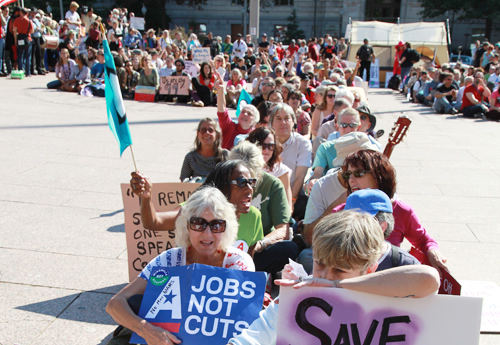 |
|
OCCUPIERS UNITE: Demonstrators gather in downtown Washington, D.C. on October 6, as part of the "Occupy Together" movement (WEN QIUSHI) |
"The causes for people rising up historically and currently are many, but it is not something that falls from the sky. Rather it has deep roots in the social order that is making life barely bearable for many," Dunbar-Ortiz told Beijing Review.
In the past 10 years, the United States has experienced a growing wealth gap and a shrinking middle class.
According to a CBS News report, the average middle-class family's yearly household income was $49,445 in 2010, falling $3,719, or 7 percent from 10 years earlier. And the job market has been dismal. Statistics show that between 1999 and 2009, the net employment gain in the American workforce was zero.
Economist Jared Bernstein was quoted by CBS News saying the income of poor families decreased by 12 percent, dropping from $13,538 to $11,904 in the past decade, while the top 1 percent of earners enjoyed 65 percent of all income growth in the United States for much of the decade, "only briefly interrupted by the financial meltdown of 2008 and now, by the look of things, back on track."
The financial crisis exposed long-term problems in the U.S. economy. Even though the government has tried to boost the economy, the situation has shown little sign of improvement.
Figures from the Bureau of Labor Statistics show that the U.S. unemployment rate has been around 9 percent since April. In September, the jobless rate was 9.1 percent, with 14 million people unemployed, among whom 44.6 percent had been jobless for 27 weeks or more.
Filling that job gap is key to recovery. President Obama proposed a $447-billion job bill, which included $78 billion in tax cuts for businesses, $105 billion for infrastructure projects, $175 billion to cut employee payroll taxes, and $54 billion for unemployment insurance and transitional work programs. But the Senate defeated the plan in a recent procedural vote.
Labor unions started to join forces with the protesters to complain about the unfairness of the economy, bringing even more momentum and media coverage to the movement.
Some argued that with big, established organizations like unions and political lobbies getting involved, this grassroots movement might face the challenge of building a broad coalition while avoiding connections with the old guard.
Analysts compared the leftist "Occupy Wall Street" movement to the conservative Tea Party. While Tea Party activists, many supported by top party leaders and donors, volunteered for Republican candidates, "it's yet to be seen how the decentralized 'Occupy Wall Street' will respond to the attention from Democrats," according to a Business Week report.
"I am not certain that the activities by the 'Occupy Wall Street' group will have any impact. The reason that I suspect that there will be little impact is that the group doesn't have any cohesive demands," said Jennifer Blouin, an associate professor of accounting with the Wharton School of the University of Pennsylvania, during an interview with Beijing Review.
Her colleague Lawrence Gelburd is more optimistic about the power of the crowd. Three weeks are not usually enough time to enact social or political change in the United States, Gelburd told Beijing Review. "But there is potential in the longer term," he said.
The campaign could lead to changes in U.S. laws and in corporate behavior, but the likelihood of this depends on the "duration, intensity and media coverage," said Gelburd. And the degree will depend on campaign organizers' ability to articulate an overall set of principles as well as specific recommendations for change, he added.
The bright side of the movement, Gelburd pointed out, is that "peaceful protests give citizens the opportunity to have their opinions heard by a large audience."
Dunbar-Ortiz said the widely spreading protests are the beginning of a process in the United States initiated by young people who have been inspired during the past year by resistance movements in North Africa, and in Spain, Greece and the UK.
The movement "will continue and grow and mature, developing a culture of resistance," she said.
How much longer will the protests last and how will they develop? Jin Canrong, Deputy Dean of the School of International Studies at the Renmin University of China predicted three possibilities.
The protesters may end the "occupation" as the weather gets cold, since there is no clear cohesive demand and there is lack of leading organizer, Jin told Beijing Review. They may disband for a while and come back again next year. Or they may turn into a powerful movement with the participation of unions or even political intervention, he said.
"If the movement escalates, there will be serious consequences," Jin said. "It will accelerate the fragmentation of U.S. society and exacerbate economic problems."
(Reporting in New York City, with additional reports from Ding Zhitao in Philadelphia and Yan Wei in Beijing) | 